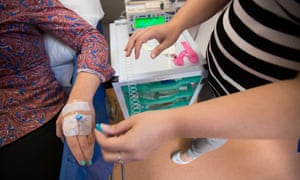
A ketamine-like drug that could be licensed in the UK as soon as November could transform treatment for severe depression, one of the country’s leading psychiatrists has said.
The drug, called esketamine, which is administered through a nasal spray, would be one of the first “rapid acting” drugs for depression and the first drug in decades to target a new brain pathway.
Unlike conventional antidepressants, which take weeks or months to take effect, ketamine has been shown in some patients to have enduring effects within hours.
Prof Allan Young, director of the Centre for Affective Disorders at King’s College London, said that for the substantial portion of patients who do not respond to conventional drugs, ketamine-based therapies could offer new hope.
“We haven’t had anything really new for 50 or 60 years. What’s particularly exciting is the arrival of a new type of treatment and that’s ketamine,” he said. “It’s got a different pharmacology. It’s not just the same old steam engine, it seems to work in a different way and it seems to work more quickly.”
However, other experts have raised questions about the overall effectiveness of the drug and say there could be serious safety risks associated with taking ketamine over long time periods.
The European Medicines Agency and the UK health regulator will make a decision in November on licensing the drug, which Johnson & Johnson sells in the US under the brand name Spravato. If approved, esketamine would become available through private clinics. Nice are scheduled to make a decision on whether to approve the drug for NHS use in March next year.
Young believes the drug could prove to be an important alternative for the roughly 2.7 million people in the UK who suffer from chronic depression and have not responded to conventional drugs.
The most commonly used drugs, known as selective serotonin reuptake inhibitors (SSRIs), work by stopping the brain mopping up the chemical serotonin. They typically take six to eight weeks to have an impact on symptoms.
Ketamine appears to act on a different brain chemical called glutamate, and in animal studies has been shown to restore connections between brain cells that are thought to shrink back during prolonged periods of depression.
Prof Carlos Zarate, head of experimental therapeutics and pathophysiology at the US National Institute of Mental Health, who conducted the first clinical trial of ketamine for depression in 2006, said: “Ketamine is now the prototype of the future generation of antidepressants that will have rapid robust effects within a few hours and are long lasting.”
In the nasal spray form, it is given in far lower doses than the street drug ketamine.
However, the side effects that patients experience, which can include hallucinations, dizziness and feelings of anxiety mean they need to be supervised in a clinic for two hours after each weekly dose of the drug. The huge amounts of clinical supervision involved could be a barrier to it being made widely available.
Earlier this year, the Food and Drug Administration (FDA) in the US licensed the drug for treatment resistant depression. The decision was controversial because the FDA relaxed its usual rules for approving drugs on the basis of clinical need. Trial results have been mixed and mostly short-term, and some say the drug is not worth the $32,400 (£25,808) per patient per year that is charged for the drug in the US.
There are also questions about the long-term safety of taking ketamine-like substances, including whether patients could develop tolerance to it and whether, for some, it could act as a gateway into illegal drug-taking, as seen in the opioid crisis.
Rupert McShane, a consultant psychiatrist and associate professor at the University of Oxford who has treated hundreds of patients with chronic depression with intravenous ketamine, is calling for a registry to help monitor the effectiveness and any unexpected side effects if the drug is made more widely available.
There are also concerns that hype around the potential of ketamine to treat depression could lead some people to seek out the drug illegally and self-medicate.
“The potential for harm with long-term use is simply unknown,” McShane said. “It’s a drug, not a miracle,” he added. “Ketamine, in my experience, and esketamine, according to the data, are potent and potentially transformative antidepressants.”
Wes Boyd, associate professor of psychiatry at Harvard, said it was of concern that some clinical trials had not shown significant benefit compared to placebo and that another trial suggested that only some patients benefited.
“The cost of esketamine is dramatically high and comes with a very large and scary side-effect profile,” he said. “It is so potentially dangerous that clinicians are required to sit with patients for two hours after they are administered the drug. There is no other antidepressant that I know of that requires one hundredth of that kind of observation after administration. The upshot is that the drug is an over-hyped ripoff.”
[“source=theguardian”]

